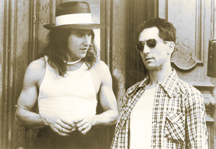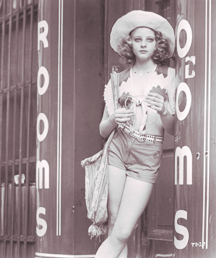Putting a Pimp in His Style: Harvey Keitel (left) talks up his sexual stable to Robert De Niro in 'Taxi Driver.'Twenty years later, director Martin Scorsese's seminal independent film 'Taxi Driver' still describes our jaundiced world
By Richard von Busack
I've always believed that you can't see the same movie twice. It's like crossing the same river twice: the river changes and so does the man. The context in which a movie is seen changes also. The world that the movie portrays is different every time, because of the way the world outside the movie theater changes. And the person watching has been changed by life, so that new intonations, new inflections emerge from the film.
This rule seems to be have been bent by Martin Scorsese's Taxi Driver, which has been reissued in a new stereo print on its 20th birthday. It is almost unique among the movies of the mid-'70s, because the world it portrays has changed almost not at all. If anything, the film's bilious view of urban living during the Bicentennial has been accepted, embraced even, by the mainstream audience. Taxi Driver's general suspiciousness of politicians, its conviction that the inner city is awash in drugs and sex for hire and its voicing of the wrath of the righteous looks all too familiar in 1996.
Pertinence aside, Taxi Driver is a peculiarly vivid film, and its details linger, even after two decades. I still remember the young hooker Iris' breakfast of toast with jelly and sugar on top; and the obscene red-enameled fingernail on the pimp Harvey Keitel's hand. The film is a masterpiece, in the original sense of the word. The young Scorsese's reputation was made by Taxi Driver; as a film teacher and filmmaker, he has exerted a dominant influence on independent, outside-of-Hollywood movies ever since.
You Talkin' to Me? Taxi Driver's on the World Wide Web:
Internet Movie Database entry on 'Taxi Driver'
The film details the story of Travis Bickle (Robert De Niro), a sociopath who drives a hack in the worst parts of New York looking for a way to wipe clean the human filth he sees everywhere. It is the film's (and, of course, De Niro's) peculiar trick that we know both nothing and everything about the character. We catch little passages from his diary, about the things he sees; the film begins and ends with him on the job, and he's completely defined by it.
Scorsese and screenwriter Paul Schrader provide us with a few other facts: Bickle is an ex-Marine, possibly a Vietnam vet, who lives in a flea-bag hotel; he is tormented by headaches, which he nurses with porno films and peach brandy. In filling in the blanks of Bickle's life, Scorsese gives the viewers a lesson in the art of direction: namely, the creation of a view of the world so convincing that every performance, every object in every scene reinforces and underscores that view.
In photographer Michael Chapman's lens, Taxi Driver's exteriors are like poison candy. He thrusts us into a New York of magenta and green neon, a New York in which the streets are always slick with rain, and the sidewalks are full of brawlers, ravers and whores. Long-time Hitchcock collaborator Bernard Herrmann's soundtrack (his last) fills Bickle's cage with ominous sighing strings and a snare drum that are like the rattling breath of the city, layered with overripe saxophone glissandos for the nocturnal scenes.
The music suggests escape and romance, but there is no hope of escape for Bickle--not into a better job, not even into what was left of the '60s dream world of country living and free love (and there was quite a bit of it left in 1976). Bickle comments that he saw a picture of a commune in a magazine once, and it didn't look very clean to him.
Equally hopeless is the chance for change from above. Charles Palantine (Leonard Harris), the campaigning senatorial candidate (and assassination target) who accidentally crosses Bickle's path, is another breed of sociopath. Like Bickle, Palantine is willing to be whatever people want him to be; he has the gall to tell Bickle that he's learned "as much in taxi-cabs as he has in limos."
Love for Sale: Jodie Foster as Iris the hooker.We are led to see the world through Bickle's eyes, through the eyes of a madman who doesn't have the first idea of how to connect with other people, but who desperately wants to do so. It's as if the world were behind glass, on the other sides of windshields, mirrors and television screens. Being on his side of the glass, you have no choice but to identify with him.
Bickle's misbegotten attempt to woo a similarly rootless campaign worker named Betsy (Cybill Shepherd) misfires horribly, and he doesn't understand why. The courtship is almost too easy. Bickle has the peculiar astuteness of a disturbed person--how they can, at least at first, tell you only too well what you want to hear, be the person that you want them to be.
His friendships with the other drivers never get past the surface; no doubt, they'll later tell the police that he seemed like a nice, quiet guy. It's perhaps significant that even the two people who change the direction of Bickle's life, a gun salesman and the teenaged hooker Iris (Jodie Foster), both give themselves the nickname "Easy."
When the psychic dam finally breaks--in a painful, grim and unvoyeuristic rampage that shocked me then and shocks me now--it all makes sense. Scorsese saves his best trick for last: the violence suddenly puts you on the right side of the glass again.
Taxi Driver is a strangely funny movie in places. The casting of Albert Brooks in a few scenes as a comic relief--as well as a scene of Scorsese himself as a homicidal cuckold in the back seat of Bickle's cab--shows the director both in love with the erstwhile man of action and despising violence too. Schrader's screenplay is a small-town man's vision of a city as the mouth of Hell, but Scorsese is ironic enough to play some of the most impassioned parts of Schrader's tirade as horror comedy.
Schrader's 1979 film Hardcore tells a similar tale about the descent of an upright man into the world where sex is sold. Hardcore is much less ironic than Taxi Driver, and thus a much less memorable movie. Still, judging irony in films is difficult; and the final shoot-out (and the coda to that blood bath), was condemned as crude rabble-rousing by some critics when the film first came out.
At first, I thought nothing had changed since Travis Bickle first appeared on screen, but I was wrong. Twenty years later, the movies have had plenty of time to dwell on his avenging massacre. Taxi Driver represents the beginning of a new aesthetic in American independent film. Violence, the province of the mainstream film, is here introduced into the underground and never leaves.
As teacher and influence at New York University, Scorsese left his mark on the next wave of filmmakers. Before Scorsese, John Cassavetes made intimate, improvisational films; after Scorsese, he made a mobster movie, Gloria. Bickle's rampage became the trash can through the window in Do the Right Thing, the thrill killings in Oliver Stone and Quentin Tarantino's Natural Born Killers and the boredom murders in Greg Araki's Totally Fucked Up.
Somehow, Bickle's crazy threat "Are you talkin' to me?" became a rebel yell. I can tell you that these are neither better nor worse times than 1976, but we may not have known then how much genuine longing there was to be the cleansing rain that washes the scum off the streets.
Taxi Driver (R; 112 min.), directed by Martin Scorsese, written by Paul Schrader, photographed by Michael Chapman and starring Robert De Niro, Harvey Keitel and Jodie Foster.



